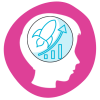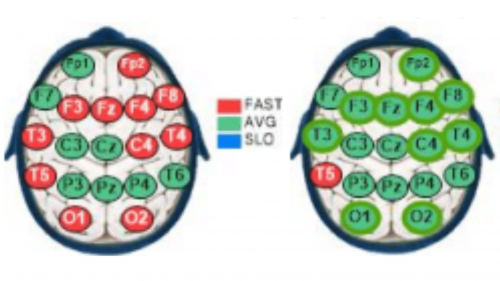
Counter your overwhelm and reset your nervous system in 7 days
7 Days to
Self Regulation
Challenge starts on April 22!















Maya 14 yr-old-girl with a history of numerous infectious diseases, including Lyme, Bartonella, streptococcus, Epstein-Barr, and mold exposure. She had a normal, uncomplicated birth and a normal childhood with no known attentional, learning, behavioral, or emotional issues.
At age 6, Maya has a tick bite with a subsequent joint pain and “what looked like a viral rash.” She was treated with two weeks of amoxicillin antibiotic treatment and both symptoms resolved. Within three to four months, Maya began to display difficulty focusing and regressed with her bladder control and sleeping through the night. Her difficulties with focus progressed over the next few months and concerns about Maya having ADHD were raised.
Approximately, ten to twelve months after the initial tick bite, Maya had a streptococcus infection that triggered an almost immediate episode of rage coupled with extreme emotionality. Alarmed, her parents sought help from their pediatrician who recommended a therapist who then recommended psychiatric medication for her mood and behavior.
Maya spent the next five years going from psychiatric medication to medication without ever getting better before her parents finally figured out that this could be PANS/PANDAS. They sought help from a PANS specialist who discovered that Maya had several infections and toxic levels of mold. She received a mixture of antimicrobial, immune modulating, and a variety of holistic and psychotherapy treatment over the course of the next two years, which resulted in significantly improved attention, mood and emotional regulation.
A recent viral infection brought on a resurgence of symptoms or also called a flare, and the return of Maya’s emotional and behavioral symptoms caused her parents to seek support and participate in our program.
Her QEEG Brain Map reflected brain inflammation, as reflected in overactivity both over the structures and in her brain communication. Maya’s brain was in a “rev state” where her brain was stuck in a “fight or flight” loop. Everything irritated her nervous system and she had many sensory triggers that seemed to send Maya into a rage. She was unable to get to school for several weeks by the time she began treatment.
Phase one of her program focused on calming her brain first through a combination of neurofeedback, PEMF, dietary changes, dietary supplements, detoxification and gut support, and parent coaching to manage outbursts. Once the intensity and frequency of her outbursts subsided, somatic therapy was added.
Phase two focused wellness and nutritional coaching to support Maya and her family in integrating lifestyle changes into their daily routines, as well as getting Maya back to school.
QEEG Brain Map Comparison from QEEG #1 to #3 after 40 sessions of Neurofeedback,
12 sessions of PEMF/BRT therapy and parent and individual therapy in our BrainBehaviorReset™ Program.

With 40 sessions of neurofeedback, 13 sessions of PEMF combined with biofeedback, parent coaching and somatic therapy, Maya’s amplitude (overactive brain wave activity) decreased on average by more than 50% diffusely but more so with Delta and Beta. Behaviorally, Maya’s emotional and behavioral outbursts decreased from at least three episodes a day to one every seven to ten days with less intensity and of shorter duration. Maya was able to participate in counseling sessions, inegreate dietary and lifestyle changes, and return to school (tiered return).
These case studies are a description of the experiences of our clients. We have changed the names and some details to protect their privacy. Each client experience and protocol is unique in our trademarked BrainBehaviorReset™ Program.


Counter your overwhelm and reset your nervous system in 7 days
Challenge starts on April 22!
147 Therapist-Endorsed
Self-Regulation Strategies
for Children
A Practical Guide For Parents
